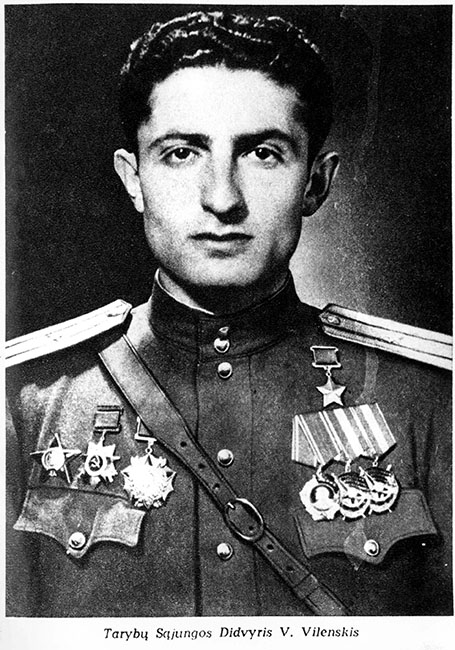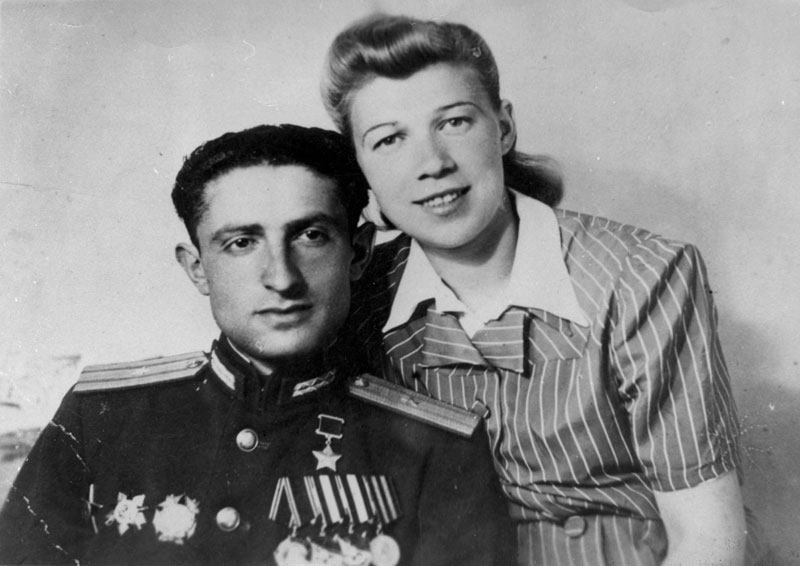Vulf (Wolf) Vilenskii (in Lithuanian Vulfas Vilenskis) was born in 1919 in Kaunas, Lithuania into a traditional Jewish family. His great-grandfather was a "cantonist" or soldier of Tsar Nicholas I and the memory of that brave ancestor Velvele the eternal soldier, after whom Vulf was named, was long revered in his family.
The young Vulf first studied in a heder, then for a short period in Kaunas' Hebrew-language religious high school Yavneh. In 1936 the youth graduated from the city's ORT school. As a young man Vulf initially had sympathy for the Soviet Union but soon changed his view and became a leader of the local branch of the Jewish socialist movement HaShomer HaTsair. In 1938 he became a member of a group that was undergoing agricultural training on a farm near Kaunas to prepare them for life in Palestine.
In the spring of 1940 Vilensky was called up for active service in the Lithuanian army. After the annexation of Lithuania to the USSR in the summer of that year he found himself in a unit of the Red Army. In the fall of 1940 he was sent to officers' school in Vilnius. After the Soviet-German war broke out on June 22, 1941, the students were sent to the front. From the first days of the war Vilensky took part in defensive battles in Belorussia. However, the students were soon sent to the rear to complete their training. At the end of 1941 the Soviets formed ethnic-based divisions. In this framework they established the 16th Lithuanian Infantry Division, whose members had to be former citizens of Lithuania (including Jews) and ethnic Lithuanians who were residing on Soviet territory. With the rank of lieutenant in this division, Vilensky was the commander of a battalion. Later, with the rank of major, he served as commander of a regiment. In January 1943, when it began to engage in combat, 34 percent of the members of the Lithuanian Division were Jews. The Division took part in battles in the Kursk salient and near Orel, and in 1944 it helped liberate Belorussia and Lithuania. Vilensky was wounded in battle four times. While at the front, in 1943, he married Sonia Ivenskite, from Kaunas, who at age 18 had volunteered to join the Red Army and served as a medical orderly in the 16th Division, where she evacuated wounded from the battlefield. After participating in fierce battles in 1943, she was awarded a Far Combat merit medal. The following year Vilensky learned that most of his family members who had remained in Kaunas had been killed by the Germans.
At the front Vilenskii joined the Komsomol and, later, the Communist Party. On more than one occasion, for personal bravery and leadership, Vilensky was honored, included with the Alexander Nevsky officers' order, two Orders of the Red Banner, one Order of the Patriotic War, 1st class, and one Order of the Red Star.
In October 1944 during fierce fighting around Klaipeda, when his battalion was up against the regiment of the Herman Goering SS Division, Vilensky not only had to command the battalion but also to fire a machine-gun. He succeeded in repulsing the attack and halting the German counter-offensive. For this achievement he was awarded the title of Hero of the Soviet Union. In February 1945, on orders of the command of the Baltic Front he was assigned to study at the Frunze Military Academy. He learned that he had been recognized as a Hero of the Soviet Union from a newspaper in March 1945. While studying at the Frunze Academy he became a member of the Jewish Anti-Fascist Committee. In 1948 he was presented to Golda Meir (then Meerson), Israeli ambassador to the USSR. Around this time Vilensky wrote several articles in Yiddish that were published in the JAC newspaper Eynikayt. They included a December 9, 1947 review of the play "The Woods Are Making Noise" performed by Moscow's State Jewish Theater (GOSET). On January 15, 1948 an obituary appeared about Solomon Mikhoels, the chairman of the JAC and head of GOSET, who was killed in Minsk on orders from Stalin (although the contemporary official version was that Mikhoels had been run over in an accident).
After completing studies at a military academy in 1948, Vilenskii was appointed chief of staff of a regiment in Lithuania and, then, in early 1953 its commander. Soon afterwards he received the rank of colonel. In the early 1960s he began serving as a military commissar in Kaunas and an instructor in the military faculty at the Vilnius State University. In 1975 he applied for an exit visa to Israel, where his son and daughter were living with their families. Vilensky was not permitted to leave the country for eight years. He finally left for Israel in 1983. There he was awarded the honorary rank of colonel in the Israel Defense Forces. Vilensky died in 1992.
Article about Vilenskii
Vilenskii was quoted as follows in the article "Senior Lieutenant Vulf Vilenski" by M. Liubetskis that appeared in Eynikayt:
"My only goal in life is to destroy as many Germans as I can. I am taking revenge for my murdered parents, for the destroyed life of my family, for the thousands of lives of Jewish children, old people, and women that the Hitlerites murdered in my Lithuania and in other places, I swear this as a Soviet officer and as a Jew."
From: M. Liubetskis, "Der elterer leitenant Volf Vilenski" (Senior Lieutenant Vulf Vilenski), Eynikayt, September, 30, 1943.








